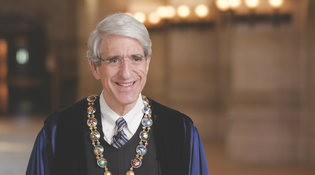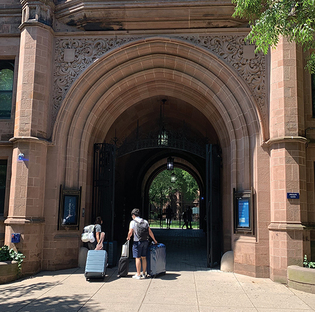
Hello everyone! To first-year, transfer, and Eli Whitney students: welcome to Yale! I also extend a warm welcome to all the family members and friends who join me in recognizing this milestone in your lives.
Today we begin a new academic year at a time of significant upheaval. Historically, social conflict and disease pandemics have catalyzed change, and so we should not be surprised that many are calling now for further transformation of our society.
We are dealing with two parallel crises: the COVID-19 pandemic and the racial inequality and injustice rooted in our country’s history of slavery and still facing us today. We have all been affected by these challenges, especially members of Black and brown communities who bear the brunt of these burdens.
I have been giving a lot of thought to the university’s role in addressing difficult social issues. Much remains to be answered in this turbulent period, but what is certain is that the core mission of Yale is more relevant than ever.
I am sure each of you has studied Yale’s mission statement:
Yale is committed to improving the world today and for future generations through outstanding research and scholarship, education, preservation, and practice. Yale educates aspiring leaders worldwide who serve all sectors of society. We carry out this mission through the free exchange of ideas in an ethical, interdependent, and diverse community of faculty, staff, students, and alumni.
Research, scholarship, education, preservation, and practice are vital to understanding our past, building on hard-earned progress, identifying what still needs to be done, and creating change. You know this; it is why you are here.
You will be studying with professors who use their knowledge and expertise to improve the world. Yale faculty members work with government officials and others on containing the spread of infectious diseases, mitigating health disparities, transforming policing, and reforming the criminal justice system.
While addressing challenges like these, you will learn from your teachers how to analyze problems, think critically, and communicate clearly. Along the way, you also will be encouraged to focus on yourself. Whether fighting a global pandemic or the scourge of racism, global climate change or economic recession, we must be willing to be honest about our own motivations and open to changing our minds. Efforts to solve pressing problems will not be effective if they are led by individuals who cannot feel compassion nor learn to cooperate, nor by those who try to achieve change through manipulation, coercion, or brute force.
Yale’s faculty understands this. I recently discussed compassion with Sterling Professor of Sociology Elijah Anderson. He has contributed immensely to the study of racial inequality, particularly in urban settings, but he also has put his expertise into practice as a consultant to the White House and to Congress. I asked him, how does he teach students who want to improve the world?
He told me that he shows his students how to see the world from the point of view of others—how to have empathy. Such an ability, he noted, can help us to be better scholars and students, to be more sensitive to the human condition, and to be more self-aware. When we are motivated by empathy, compassion, and cooperation, we can bridge differences, learn to understand one another, and enact meaningful, sustainable change.
Empathy and compassion—a willingness to engage those with whom we may not see eye-to-eye and a concern for the misfortunes of others—are preconditions for cooperation. Cooperation—working together to solve a common problem, especially one that we cannot overcome by working alone—requires us to listen to each other charitably, appreciate each other’s perspective, and inhibit our desire to dismiss individuals with whom we initially believe we cannot develop common purpose.

Mark Alden Branch ’86
The enemies of compassion and cooperation are fear and anger. I am not saying that it is inappropriate to experience the fear caused by a pandemic of a novel virus that can be fatal. And I am not saying that one shouldn’t feel anger, indeed, outrage, at the killing of George Floyd by former officers of the Minneapolis police department. In fact, COVID-19 makes me anxious; and those former officers, who took a sworn oath to protect the public, leave me livid. But, although such fear and anger can be motivating, I must ensure they do not prevent my finding common ground with well-meaning others whose approaches to societal challenges are not the same as mine. I must engage them rather than attempt to silence them to accomplish anything real and lasting.
Let me provide an example from politics. At one time, women who became pregnant and men who wanted to take time off from work to care for an infant were at risk of being fired by their employers. But in 1993, the US Senate passed the Family and Medical Leave Act, guaranteeing family members the ability to take a prolonged unpaid leave without risking their jobs in order to tend to a newborn, adopt a child, or assist a sick family member.
How did this act—which was considered revolutionary at the time—pass? Well, it was developed cooperatively by Senator Ted Kennedy, among the most liberal of lawmakers, and Senator Orrin Hatch, among the most conservative. They opposed one another on many policies, but in this case, they found a common cause: supporting families. They both felt compassion toward individuals at risk for losing their jobs due to childbirth, and—perhaps more important—they respected each other as individuals, listened to each other, and placed national interest ahead of party differences. Their cooperation led, ultimately, to significant social change.
One final thought about the importance of compassion and cooperation: Most of you, members of the Class of 2024, are part of Generation Z, the post-millennials. I am, well, a Baby Boomer. Perhaps you have heard that you and I are quite different. True, you are the first “digital natives,” and the only world you have ever known has included the smart phone, texting, and social media. And you are distinctive in other ways as well. Yours is the most racially and ethnically diverse generation in American history, and you also promise to be the best educated.1
But it is not only that we are different in these ways; we also are said to disagree. We are told we have different views on politics, music, and work. I am sure you are familiar with the stereotypes that exaggerate our differences. Stereotyping is another barrier to compassion and cooperation.
For example, you fault my generation for the great problems of our time. And my generation too often fails to understand you. We pass you on the sidewalk, mystified by your ear buds and your clothes. We tell you to grow up, to get off social media, to develop some real-life coping skills, and to get out of your parents’ basements and get a job. And to us you say, “OK, Boomer.” Thanks to an article I read in the Wall Street Journal—a print edition of it, in fact—I am told this is a “sly linguistic weapon of intergenerational warfare.”2
Well, although such stereotypes give rise to internet memes and other kinds of clickbait to get us to think of our differences as “intergenerational warfare,” we are not at war. Those are distractions, and they won’t help us link arms in overcoming what may be standing in the way of our future—our shared future.
At the heart of “OK, Boomer” is the belief that my generation contributed to the serious, even existential, problems in the world that you will enter and lead. Your generation sees the challenges posed by climate change, disease, abusive policing, war, racism, and poverty. You recognize the urgency of these problems. But my generation does as well. Instead of dismissing one another’s perspectives and focusing only on difference, we need to direct our attention to creating something better for all who will follow us. We can only do that by harnessing our compassion and cooperating.
Here at Yale, we learn from each other. That is why academics like me enjoy spending their entire lives on college campuses. And it is why you chose to come to Yale. The passing of knowledge and the responsibility to do some good with it from one generation to the next is a large part of Yale’s mission. It is hard work.
So, please: use your time at Yale wisely. Let us devote ourselves to learning together, to the personal transformation that the pursuit of knowledge can create for each of us. Let us use these college years to change ourselves—to become more compassionate human beings. And then let us work cooperatively on existing and emerging challenges to create the world we desire.
Welcome to Yale!
Footnotes
1 R. Fry and K. Parker, Pew Research Center Social and Demographic Trends, 2018.
2 B. Zimmer, Wall Street Journal, 2019.
 loading
loading
